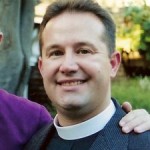A lone tenor voice rises from the front of the Episcopal Church of St. John the Evangelist, its tone sliding sharp as it creeps past the 98-year-old wooden rafters. Reverend John Kirkley’s holy chant then reverberates through the vaulted ceiling before rushing to the chapel’s floor.
There, it meets an unusual chorus.
Men harmonize with their husbands and women with their wives. Transgendered worshipers find their pitch, and a few heterosexuals push the solemn chant along.
“Blessed be the one, holy, and living God,” Kirkley sings, and then everyone joins. “Glory to God forever and ever.”
Thus begins the Sunday morning Eucharist at St. John, a predominantly gay and lesbian church on 15th
Street in the Mission District. Here, congregants are trying to figure out where they fit within a religious tradition often hostile to homosexuals — and within a gay and lesbian community that is often hostile to Christians.
That is especially true now. Californians will vote in November on Proposition 8, a ballot measure that would amend the state constitution to define marriage as between one man and one woman. At the same time, the Episcopal Church faces the possibility of a global schism, as dioceses debate the increasingly prominent role homosexuals have taken within the church’s political structure.
Kirkley married Andrew, his partner of 15 years, in September. If passed, Proposition 8 might render their marriage legally meaningless. It’s an issue of human rights, Kirkley says, adding that his church, which is 70 to 75 percent homosexual, has officially opposed Proposition 8.
But Kirkley draws a distinction between civil and religious marriages. He calls marriage a religious sacrament–similar to baptism or communion. The act is a reflection of God’s love to be displayed to and affirmed by the church and the community. He says that even without official state recognition, the church would still recognize his marriage.
“The church has said, ‘We see that same sign of God’s love. Why would we not recognize and bless what God has already recognized and blessed?’” Kirkley says.
It’s a sentiment shared by many in his congregation, including Karekin Yarian and Anthony Anchundo, who will be married at St. John next month.
“I know I have God’s blessing,” says Yarian. “It’s nice to have the church recognize that. And having it recognized politically is an important battle.”
Meanwhile, some Episcopal dioceses ban gays and lesbians from membership while others appoint openly gay leaders. Many news reports have characterized the divide as existing between pro-gay churches in the west and anti-gay churches in Africa and southeast Asia. But Kirkley sees the divide as deeply theological–not geographical.
“This goes far beyond homosexuality,” he says. “The Anglican Church has always held diverse opinions in tension, and now that is being challenged. Historically, Episcopalians’ gift to Christendom has been this gift of inclusiveness. Inclusiveness of people and of ideas. This attitude of not pretending to know the mind of God and having a willingness to accept ambiguity and celebrate mystery.”
Kirkley calls fundamentalism a “modernist phenomenon” within the church, saying that it has taken root in some societies where churches were planted by missionaries in the 19th century. In those churches–many of which are in Africa and Asia–fundamentalist Christianity remains dominant.
“As fundamentalists have imposed their narrow view, they have gone to other parts of the Christian community for support,” says Kirkley, who grew up Southern Baptist in Indiana.
More conservative Christians use a literalist view of the Bible to argue that homosexuality is sinful, but Kirkley says that his tradition draws on a mix of scripture, logic and experience to construct theological beliefs. He has little interest in debating Biblical literalists and says that rather than fighting the religious right, he wants to engage the more secular left.
“I don’t feel particularly called to justify my existence to other Christians,” he says. “I am well past the point of making homosexuals acceptable to the church. I’m much more interested in making Christianity acceptable to gay and lesbian people.”


Testing the comment function. Good story Jordon. You should look at today’s story about a congregation breaking away. There are a lot of good numbers in it. lc